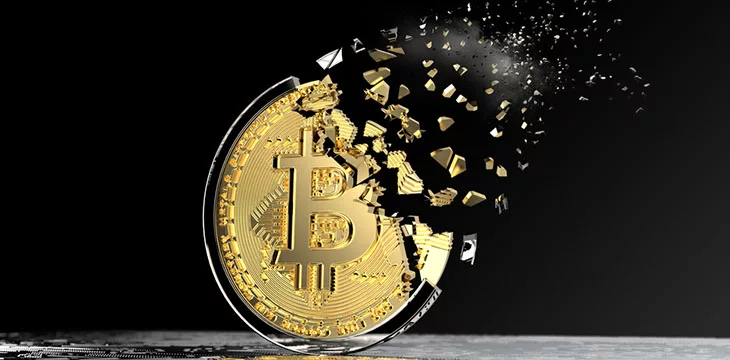|
Getting your Trinity Audio player ready...
|
The so-called ‘crypto crackdown’ was kicked up a notch this week, with the Securities and Exchange Commission (SEC) announcing charges against the two biggest exchanges in the world: Binance and Coinbase (NASDAQ: COIN).
Most immediately, the actions could lead to devastating financial penalties for the exchanges, as well as the evaporation of their most lucrative revenue streams. The charges are also likely to embolden any other legal or regulatory actions pending against the two exchanges, such as the Department of Justice’s (DOJ) money laundering and sanctions investigation into Binance.
More than that, however, is the effect that the SEC action is likely to have on the rest of the industry, many of whom are engaged in exactly the same conduct that just got Binance and Coinbase hit with SEC charges.
Binance and Coinbase behavior commonplace throughout the industry
The key thrust of the SEC’s case against Coinbase, Binance, and Changpeng Zhao is that the exchanges listed digital assets that amounted to securities without securing authorization as a registered exchange or securities broker-dealer, violating the Exchange Act. This makes the corporate entities liable, as well as any individual or entity in control of them—which is how CZ became named as a defendant by the SEC.
The SEC would only need to prove that any exchange not registered with the SEC (read: all of them) listed any single security on its platform to make out a case under the Securities Act and the Securities Exchange Act. That’s why in its filings against Binance and Coinbase, the SEC presented a ‘non-exhaustive list’ of digital asset securities listed by each exchange.
For Binance, these are:
- SOL, the native token of Solana
- ADA, the native token of Cardano
- MATIC, the native token of Polygon
- FIL, the native asset of Filecoin
- ATOM, the native asset of the Cosmos Hub
- SAND, the ETH-based native asset of the Sandbox platform
- MANA, a digital token minted by virtual reality platform Decentraland
- ALGO, the native token of the Algorand blockchain
- AXS, the ETH-based native tokens of the Axie Infinity blockchain game
- COTI, the native token of the Coti blockchain and ecosystem
The non-exhaustive Coinbase list also includes SOL, ADA, MATIC, FIL, SAND, and AXS, as well as:
- CHZ, the ETH-based token for the Chiliz ecosystem powering Socios.com
- FLOW, the native token of the Flow blockchain
- ICP, previously called DNF, which is the native token of the Internet Computer Protocol
- NEAR, the native token of the NEAR blockchain
- VGX, the native token of Voyager (NASDAQ: VYGVQ)
- DASH, the native token of the Dash blockchain (NASDAQ: DASH)
- NEXO, the exchange token of Nexo
You’ll notice right away that, far from being a collection of little-known tokens existing at the periphery of the digital asset zeitgeist, many of the coins included in this ‘non-exhaustive’ list are widely popular. Three of them—ADA, SOL, and MATIC—are in the top 10 coins by market cap.
This means almost every exchange you can think of—if not every single one of them—is currently listing digital asset securities without registering as a securities broker-dealer, clearing house, or exchange in violation of the Securities Act and the Securities Exchange Act.
Take Kraken, for instance, the third-largest exchange by volume and—probably worryingly for their executive team—the only one of the top three digital asset exchanges not currently the target of SEC charges. Kraken currently lists every single one of the tokens identified by the SEC as digital asset securities. Given that Kraken is not currently registered with the SEC, it is every bit in violation of U.S. securities laws, as Binance and Coinbase are. The only difference, in practical terms, is a matter of degree.
So, why isn’t everyone under the gun?
As for why Coinbase and Binance have been charged by the SEC while Kraken and the numerous other exchanges listing the same token have not: it’s only Wednesday. Give it time.
When charges were announced against Binance on Monday, other exchanges might have been able to comfort themselves by pointing to the sheer audacity of Binance’s regulatory evasion over the past five or so years. After all, it’s clear that Binance has never been interested in compliance. To this day, it’s impossible to say where ‘Binance’ is even headquartered (Zhao once infamously tried to say that Binance doesn’t have an office because ‘Bitcoin doesn’t have an office’) because the company hops in and out of jurisdictions as demanded by the moment.
Most recently, the company announced it was exiting the Canadian market because the country’s attempts at shoring up its digital asset regulations left it in an untenable position; it turned out that two days before the pull-out, Binance had been served with an investigation order by the Ontario Securities Commission (OSC).
For a time, you might have been able to convince yourself that this jurisdiction-hopping was a benign coincidence. However, all the worst fears about Binance were confirmed in a series of investigative reports by Reuters since 2022, which cited internal Binance emails showing that the company had eschewed legal compliance to pursue fast growth at the personal behest of Zhao himself. Lax compliance controls are what paved the way for the exchange taking millions in illegal money from sanctioned countries such as Iran and who knows where else and are evidently at least part of how Binance became the industry’s largest exchange.
So, there were plenty of reasons to think that the SEC training its crosshairs on Binance was simply a case of the SEC going after the most flagrant and egregious violator of U.S. securities laws in modern history.
With Tuesday’s announcement that Coinbase would be hit with substantially similar charges as Binance, that saving grace has gone up in smoke. Coinbase, though almost certainly having made most of its money by illegally listing and trading digital asset securities, was not quite as publicly disdainful of complying with the law as CZ and Binance were—and yet here they are being pursued by the SEC for disgorgement and civil penalties.
Now, it looks a lot more like the SEC believes virtually every exchange is non-compliant in the U.S., and is simply making its way through the list of the largest offenders starting at the top. It’s inconceivable that the SEC would bring charges against every exchange doing business in the U.S., but the notion that the SEC would stop at Coinbase and Binance is just as inconceivable. The only question is how far down the list the SEC goes in issuing charges before it decides it has had its appetite for compliance sufficiently fed.
BTC, ETH notably absent from SEC charges
Notably missing from the SEC’s list of securities are BTC and ETH, undoubtedly two of the most commonly-listed digital assets among exchanges.
Their absence from either of the SEC’s list shouldn’t be taken as a signal from the SEC that these assets are not securities. The charges make clear that the lists are non-exhaustive, and the tokens that did make either list likely only did so because many of them have been publicly designated as securities by the SEC in the past.
On top of that, the SEC and other authoritative voices from the U.S. regulatory and enforcement apparatus have become increasingly skeptical that popular digital asset projects—such as BTC and ETH—are as ‘decentralized’ as they say they are. This matters because the ‘centralization’ of a given asset has become the focal point in any Howey analysis (Howey being the test for determining whether an asset offering is an investment contract and, therefore, a security) when applied to digital assets. If a centralized group does the development of a digital asset with the power to make changes over the network, then it’s far more likely that purchasers of that asset did so on the expectation of profits derived from the efforts of others, which is the element of the Howey test that most digital asset analyses will turn on.
SEC chair Gary Gensler has said as much. Back in February, he gave an interview to New York Magazine in which he said: “At the core, these tokens are securities because there’s a group in the middle, and the public is anticipating profits based on that group.”
This puts BTC and ETH in a precarious position, as both rely heavily on the notion that they are decentralized to escape legal liability arising from their respective networks.
Gensler’s point was further driven home a month later when the New York Attorney General took action against KuCoin for failing to register as a securities and commodities broker-dealer in NY: ETH, which is listed by KuCoin, was expressly labeled as a security in the charges, which say that “ETH’s development and management are largely driven by a small number of developers who hold positions in ETH and stand to profit from the growth of the network and the related appreciation of ETH.”
So, with authorities beginning to reveal an understanding that these projects are indeed highly centralized, all that’s left to do is see where the legal consequences of this designation manifest themselves.
These consequences didn’t manifest in the SEC’s charges this week, no doubt because the Commission was evidently more than able to bring charges against the industry’s biggest exchanges. As industry-shaking as charges against Binance and Coinbase might be, it’s nothing compared to what an announcement that BTC and ETH have been securities would do to it all along. Given the deluge of amicus curiae briefs submitted by industry advocates any time the SEC brings a case, it’s perhaps understandable that the SEC wanted to keep its flagship cases against these two exchanges as free from unnecessary baggage as possible.
After all, any exchange listing BTC and ETH is likely to also be listing many of the securities specified in the SEC’s charges, so refraining from including BTC and ETH does nothing to dampen the effect this week’s announcements will have on the industry.
This isn’t to say that a reckoning isn’t coming for BTC and ETH specifically. In addition to the other arms of the law which might yet take action over these projects, a court in the U.K. is set to decide whether the centralization of BTC and similar projects means that their developers owe legal duties to users—duties which would, among other things, compel them to return access over lost or stolen coins to their rightful owners. That case, Tulip Trading v Wan Der Laan and others, is awaiting trial.
I’m an exchange: should I be scared?
The immediate takeaway from the SEC’s charges should be that if any exchange listing the above-mentioned securities hasn’t yet been charged, then it’s only by the grace of the SEC. Whether that grace lasts the week remains to be seen.
In the meantime, every exchange now has three options open to it:
- Delist every digital asset security. At this point, it’d be easier to list the digital assets that aren’t securities than it would be to do the reverse. Given that most exchanges have fattened themselves off the fees garnered from the trading of these securities, it’s questionable how many would even be able to survive financially without them. To illustrate this point, one analyst estimated that SEC action against Coinbase would wipe out ‘at least’ 37% of their net revenue.
- Register a securities exchange, broker-dealer, and/or clearing house with the SEC. Remember, Coinbase and Binance are not in trouble simply for listing securities: they’re in trouble for listing them without registering with the SEC. SEC registration attaches with it a host of additional obligations primarily aimed at protecting investors, the likes of which traditional exchanges have had to comply with for decades. To most sensible spectators, these obligations are common-sense and necessary given the asymmetry between exchanges and those using them, but to a digital asset exchange that has been getting rich for years without having to comply, it’s perhaps too big of an ask.
- Remain non-compliant. This isn’t a real option, as this week’s actions against Coinbase and Binance demonstrate. Both exchanges have been warned in the past that they are listing securities and must register with the SEC, both chose to ignore the warnings, and both are now facing the consequences. Still, if we’ve learned anything from the history of this industry, it seems inevitable that this will be the option chosen by most non-compliant exchanges.
If you’re an honest exchange looking to enter the market, then compliance is easy: just register your business with the SEC unless you plan on listing only the narrow subset of digital assets that do not amount to securities.
If you’re a legacy organization that has grown accustomed to the enormous trading volumes enjoyed by assets that it is now clear are securities, then you may feel you are between a rock and a hard place. This is the wrong way to look at it: you’ve been non-compliant since day one and, by some miracle, have managed to thus far escape paying the price for it. Recognize the Binance and Coinbase charges for the come-to-Jesus-moments they are, and register yourself with the SEC. You owe it to your customers.
Follow CoinGeek’s Crypto Crime Cartel series, which delves into the stream of groups—from BitMEX to Binance, Bitcoin.com, Blockstream, ShapeShift, Coinbase, Ripple,
Ethereum, FTX and Tether—who have co-opted the digital asset revolution and turned the industry into a minefield for naïve (and even experienced) players in the market.

 02-18-2026
02-18-2026 




